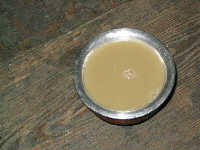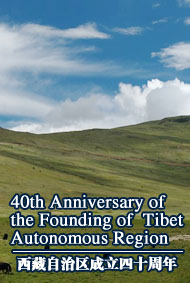|
Buttered Tea
( 2005-10-27 )
 Buttered tea is Tibetans' traditional drink. It is a necessary daily food as well as an excellent drink for entertaining guests. Buttered tea is Tibetans' traditional drink. It is a necessary daily food as well as an excellent drink for entertaining guests.
To make buttered tea, first boil brick tea in water for a long time into red thick juice. Then pour the juice into a specially made round wooden pail, and add an appropriate amount of butter (or rather the oil extracted from the milk of cows or sheep) and salt. Next, use a special stick to beat the tea (in an up-and-down motion) vigorously in the pail to fully dissolve the butter and tea. Then pour into a pot or boiler and put on a low fire. Soon the tea is ready for consumption.
Buttered tea is a very nutritious drink suited to high and cold regions. It can repel coldness, enhance body fluid while quenching thirst, and eliminate fatigue. Tibetans usually drink several cups of buttered tea in the morning before going to work.
There is a custom to follow when drinking buttered tea. When the host fills a cup and hands it to the guest, the guest should take it in both hands. Then the guest should raise the cup by the right hand, and, using the middle finger of the left hand, dip gently into the tea and flick to the sky; this means heavenly-mindedness. And the guest should also flick a second and third time, which means terra-respectfulness and Buddha-respectfulness respectively.
According to the Tibetan custom, the buttered tea is drunk in separate sips, and after each sip the host refills the bowl to the brim. Thus the guest never drains his bowl yet it is constantly topped up. If the guest does not wish to drink, the best thing to do is leave the tea untouched until the time comes to leave and then down the bowl, leaving dribs and drabs in it. In this way etiquette is observed and the host will not be offended. Thus and only thus it is in keeping with the habit and manners of the Tibetan people.
|

